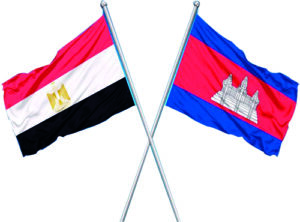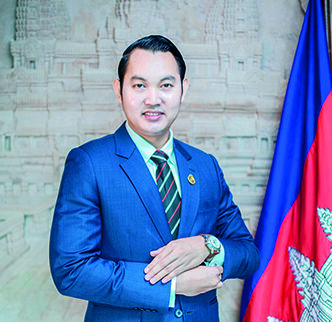About Cambodia
Officially known as the Kingdom of Cambodia, Cambodia is a pearl of the Mekong River and a country that is located in the centre of and as the cradle of the culture of the Indo-China peninsula in Southeast Asia. It is 181,035 square kilometres in the total area, bordered by Thailand to the Northwest, Laos to the Northeast, Vietnam to the East, and the Gulf of Thailand to the Southwest.

Cambodia has a population of over 16.5 million citizens, of which 90 per cent belong to the Khmer ethnic group.
In the present day, under the auspices of His Majesty the King of Cambodia and visionary leadership of Samdech Techo Hun Sen, the Prime Minister of the Kingdom of Cambodia, the country has focused on the nation building in terms of economic growth and international prestige.
The country has very open investment laws and offers a range of incentives to investors. Cambodia’s gross domestic product has grown six-fold in this time period from US$3.1 billion (1998) to US$24.6 billion (2018). One of the best reasons to invest in Cambodia is they waive taxes for the first nine years, coupled with an inexpensive skilled labour force with language skills and steady growth; this makes the kingdom quite an attractive place to invest in. Cambodia has been working very hard to further strengthen the capacity and to further promote its integration into the regional and the global economy.
To do “that” Cambodia’s vision and future trajectory is moving from agricultural sector to skill-driven industry and service oriented economy under the principles of inclusive and sustainable development. This vision and its implementation make Cambodia an attractive destination. It is not only a question of productions and services and new production plants, but also that offers opportunities for infrastructure projects and energy development.
Q: What are the main activities of the Cambodian Embassy in Cairo?
- Protect national independence, sovereignty, territorial integrity and neutrality; maintain peace, security, stability, order, and social unity.
Cambodia will continue to uphold its independent decision making in both domestic and foreign policy aspects – in politics, economy, trade, investment, especially in national security and defence – with respect to the principles of permanent neutrality, non-alignment, peaceful coexistence with neighbours and with all countries in the world, as well as peaceful settlement of disputes and mutual benefits.
Cambodia preserves and exercises its sovereign rights in pursuing a course of action that is most appropriate in safeguarding its territorial integrity and core national interests in accordance with the Constitution.
- Foster more friendship abroad based on the spirit of national independence.
Cambodia will work to better strengthen existing friendly relations, co-operation, and partnerships with other countries; restore co-operative relations with old friends, and foster good relations with a new one, especially with countries in the Eastern and Central Europe, Central Asia, Africa, Middle East, and Latin America.
Cambodia is also committed to further contribute to the enhancement of people-oriented and people-centered ASEAN Community, maintain and consolidate ASEAN unity and centrality, and through ASEAN, promote and strengthen relations with external partners for socio-economic growth and development conducted based on two fundamental principles which are an adherence to consensus in all decision-making process and non-interference in internal affairs of others.
- Promote economic diplomacy
In contribution to the realisation of the government’s vision in transforming Cambodia into a high-middle-income country by 2030 and a high-income country by 2050, the shifting focus from the practice of traditional diplomacy to a diplomacy that places economy, culture, and tourism at its cores will significantly contribute to the attraction of foreign investment, diversification of investment sources, the expansion of export markets for Cambodian products, tourists attraction, and the promotion of Cambodian culture on the world stage.
- Continue to support and strengthen multilateralism.
In the governance of the world affairs, and actively engage in global efforts in addressing challenges which threaten peace, security, rule-based international order, and sustainable development. Cambodia will continue to actively contribute to the maintenance of peace in the world by dispatching its forces to participate in the UN peacekeeping missions, professionally carry out humanitarian actions, strictly adhere to international laws and regulations, and build good relations with local community and people.
- Enhance the quality, efficiency and capacity of Cambodian diplomats.
Promoting internal reform in both physical and non-physical infrastructure has become a priority to prepare a diplomatic corps that is professional, patriotic, active, and capable.
In addition to investing in human resource development as well as professionalism to serve the core interests of Cambodia.
Q: Can you tell us more about diplomatic relations between Cambodia and Egypt?
Cambodia established diplomatic relations with Egypt in 1953. The two countries had durable and distinct historical relations, and that was particularly evident in the co-operation between President Gamal Abdel Nasser and King Norodom Sihanouk in both the bilateral context, as well as in the framework of the Non-Aligned Movement.
On the economic front, Egypt and Cambodia signed an agreement on economic and technical co-operation in 2011 to facilitate trade exchanges. Many other prospective agreements and Memorandum of Understandings are also under review and will be ready to sign in the very near future. On top of that, trade co-operation is further promoted through annual Business Forums in Cambodia which will open doors of possibilities for investors and businesspersons from both countries to explore uncharted market potentials. In this regard, Cambodia has championed “Economic Diplomacy” essentially to expedite its integration to the region and the world in order to deepen bilateral and multilateral co-operation, diversify its sources of growth and expand its economic potential with foreign partners.
Educationally, Egypt has become an essential patron for Muslim-Cambodian students and scholars who are interested in pursuing quality education through the provision of annual scholarships at the Al-Azhar University in Egypt. This area is important since human capital development is an equally necessary strategy for Cambodia to be able to speed up its transformation.
Tourism is also a key driver for both countries owing to the abundance of historical and cultural attraction sites. Egypt and Cambodia are also looking at some challenges that is clogging the smooth flow of tourists between the two sides, specifically, the absence of direct flights and difficulties in obtaining Egyptian visas.






Discussion about this post